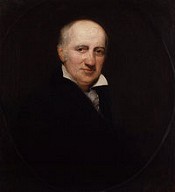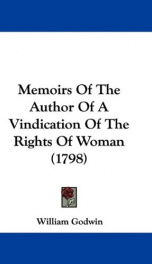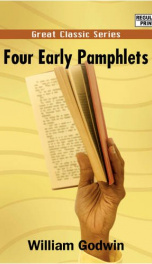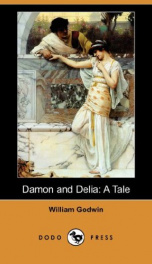Godwin William

William Godwin (3 March 1756 – 7 April 1836) was an English journalist, political philosopher and novelist. He is considered one of the first exponents of utilitarianism, and one of the first modern proponents of anarchism.[1] Godwin is most famous for two books that he published within the space of a year: An Enquiry Concerning Political Justice, an attack on political institutions, and Things as They Are or The Adventures of Caleb Williams, which attacks aristocratic privilege, but also is virtually the first mystery novel. Based on the success of both, Godwin featured prominently in the radical circles of London in the 1790s. In the ensuing conservative reaction to British radicalism, Godwin was attacked, in part because of his marriage to the pioneering feminist writer Mary Wollstonecraft in 1797 and his candid biography of her after her death; their child, Mary Godwin (later Mary Shelley) would go on to author Frankenstein and marry the poet Percy Bysshe Shelley. Godwin wrote prolifically in the genres of novels, history and demography throughout his lifetime. With his second wife, Mary Jane Clairmont, he wrote children's primers on Biblical and classical history, which he published along with such works as Charles and Mary Lamb's Tales from Shakespeare. Using the pseudonym Edward Baldwin, he wrote a variety of books for children, including a version of Jack and the Beanstalk.[2] He also has had considerable influence on British literature and literary culture. Godwin was born in Wisbech in Cambridgeshire to John and Anne Godwin. Godwin's family on both sides were middle-class. It was probably only as a joke that Godwin, a stern political reformer and philosophical radical, attempted to trace his pedigree to a time before the Norman Conquest to the great Earl, Godwin. Godwin's parents adhered to a strict form of Calvinism. His father, a Nonconformist minister in Guestwick in Norfolk, died young, and never inspired love or much regret in his son; but in spite of wide differences of opinion, tender affection always subsisted between William Godwin and his mother, until her death at an advanced age. William Godwin was educated for his father's profession at Hoxton Academy, where he studied under Andrew Kippis the biographer and Dr Abraham Rees of the Cyclopaedia. He was at first more Calvinistic than his teachers, becoming a Sandemanian, or follower of John Glas, whom he describes as a celebrated north-country apostle who, after Calvin had "damned ninety-nine in a hundred of mankind, has contrived a scheme for damning ninety-nine in a hundred of the followers of Calvin."[3] He then acted as a minister at Ware, Stowmarket and Beaconsfield. At Stowmarket the teachings of the French philosophers were brought before him by a friend, Joseph Fawcett, who held strong republican opinions. Godwin came to London in 1782, still nominally as a minister, to regenerate society with his pen — a real enthusiast, who shrank theoretically from no conclusions from the premises which he laid down. He adopted the principles of the Encyclopaedists, and his own aim was the complete overthrow of all existing institutions, political, social and religious. He believed, however, that calm discussion was the only thing needful to carry every change, and from the beginning to the end of his career he deprecated every approach to violence. He was a philosophic radical in the strictest sense of the term. His first published work was an anonymous Life of Lord Chatham (1783). He published under his own name Sketches of History (1784), consisting of six sermons on the characters of Aaron, Hazael and Jesus, in which, though writing in the character of an orthodox Calvinist, he enunciates the proposition "God Himself has no right to be a tyrant." Introduced by Andrew Kippis, he began to write in 1785 for the New Annual Register and other periodicals, producing also three novels now forgotten. His main contributions for the "Annual Register" were the Sketches of English History he wrote annually, which were yearly summaries of domestic and foreign political affairs. He joined a club called the "Revolutionists," and associated much with Lord Stanhope, Horne Tooke and Holcroft. In 1793, while the French Revolution was in full swing, Godwin published his great work on political science, Enquiry concerning Political Justice, and its Influence on General Virtue and Happiness. The first part of this book was largely a recap of Edmund Burke's A Vindication of Natural Society - an anarchist critique of the state. Godwin acknowledged the influence of Burke for this portion. The rest of the book is Godwin's positive vision of how an anarchist (or minarchist) society might work. Political Justice was extremely influential in its time: after Burke and Paine, Godwin's was the most popular written response to the French Revolution. Godwin's work was seen by many as illuminating a middle way between the fiery extremes of both Burke and Paine. Prime Minister William Pitt famously said that there was no need to censor it, because at over £1 it was too costly for the average Englishman to buy. However, as was the practice at the time, numerous "corresponding societies" took up Political Justice, either sharing it or having it read to the illiterate members. Eventually, it sold over 4000 copies and brought literary fame to Godwin. Godwin augmented the influence of the Political Justice with his publication of an equally popular novel, Things as They Are or The Adventures of Caleb Williams, which tells the story of a servant who finds out a dark secret about Falkland, his aristocratic master, and is forced to flee because of his knowledge. Caleb Williams is essentially the first thriller:[4] Godwin wryly remarked that some readers were consuming in a night what took him over a year to write. Not the least of its merits is a portrait of the English justice system at the time and a prescient picture of domestic espionage. Yet Godwin's strenuous Calvinism still obtains, if in secular form. At the conclusion of the novel, when Caleb Williams finally confronts Falkland, the encounter fatally wounds the Lord, who immediately admits the justness of Williams' cause. Far from feeling release or happiness, Williams only sees the destruction of someone who remains for him a noble, if fallen person. Implicitly, Caleb Williams ratifies Godwin's assertion that society must be reformed in order for individual behaviour to be reformed, an emphasis that allies him more with Marxism and anarchism than liberalism. His literary method, as he described it in the introduction to the novel, also was influential: Godwin began with the conclusion of Caleb being chased through England and Ireland and developed the plot backwards. Dickens and Poe both commented on Godwin's ingenuity in doing this. In response to a treason trial of some of his fellow English Jacobins, among them Thomas Holcroft, Godwin wrote Cursory Strictures on the Charge Delivered by Lord Chief Justice Eyre to the Grand Jury, October 2, 1794 where he forcefully argued that that the prosecution's concept of "constructive treason" allowed a judge to construe any behaviour as treasonous. It paved the way for a major, but mostly moral, victory for the Jacobins, as they were acquitted. However, Godwin's own reputation was eventually besmirched after 1798 by the conservative press, in part because he chose to write a candid biography of his dead wife, Mary Wollstonecraft, including accounts of her two suicide attempts and her affair with Gilbert Imlay, which resulted in the birth of Fanny Imlay. Godwin, consistent in his theory and stubborn in his practice, practically lived in secret for 30 years because of his reputation. However, in its influence, on writers like Shelley, Kropotkin, and others, Political Justice takes its place with Milton's Areopagitica, and Rousseau's Émile as an anarchist and libertarian text. By the words "political justice" the author meant "the adoption of any principle of morality and truth into the practice of a community," and the work was therefore an inquiry into the principles of society, of government and of morals. For many years Godwin had been "satisfied that monarchy was a species of government unavoidably corrupt," and from desiring a government of the simplest construction, he gradually came to consider that "government by its very nature counteracts the improvement of original mind," demonstrating anti-statist beliefs that would later be considered anarchist. Believing in the perfectibility of the race, that there are no innate principles, and therefore no original propensity to evil, he considered that "our virtues and our vices may be traced to the incidents which make the history of our lives, and if these incidents could be divested of every improper tendency, vice would be extirpated from the world." All control of man by man was more or less intolerable, and the day would come when each man, doing what seems right in his own eyes, would also be doing what is in fact best for the community, because all will be guided by principles of pure reason. Such optimism combined with a strong empiricism to support Godwin's belief that the evil actions of men were solely reliant on the corrupting influence of social conditions, and that changing these conditions could remove the evil in man. This is similar to the ideas of his wife, Mary Wollstonecraft, concerning the shortcomings of women being down to their discouraging upbringings. Godwin did not believe that all coercion and violence was immoral per se, as Bakunin and Tolstoy did, but rather recognized the need for government in the short term and hoped that the time would come when it would be unnecessary. Thus, he was a gradualist anarchist rather than a revolutionary anarchist; Godwin supported the ideology behind the French Revolution but certainly not its means. Neither was he as extreme an egalitarian as most anarchists are, but he simply thought that discrimination on grounds other than ability was immoral. His utilitarian case for saving the Archbishop of Canterbury before his mother from a burning house is seen as abhorrent even by many egalitarians. As part of the British conservative reaction that was precipitated by Napoleon's campaign in the Alps in 1798, Thomas Robert Malthus wrote his An Essay on the Principle of Population in which Godwin's views on the "perfectibility of society" plays a predominant role as a target. (Malthus had previously been a member of the same radical circles as Godwin, and pitched his attack on British radicalism as that of a disillusioned disciple.) Unlike Godwin, Malthus, using what has come to be considered rather specious statistics, predicted impending doom because of a geometrically rising worldwide population and arithmetically increasing food supply. While Godwin’s Political Justice acknowledged that an increase in the standard of living via his proposals could cause population pressures, he saw an obvious solution to avoiding such a crisis: “project a change in the structure of human action, if not of human nature, specifically the eclipsing of the desire for sex by the development of intellectual pleasures”.[5] Indeed it was this “principle of population” that provoked Malthus’s Essay on the Principle of Population in 1798.
do you like this author?
What readers are saying
What do you think? Write your own comment on this book!
write a commentWhat readers are saying
What do you think? Write your own comment on this author!
write a commentBook list

Italian Letters,Vols. I and IIThe History of the Count de St. Julian
Series:
Unknown
Year:
Unknown
Raiting:
4/5
Show more
add to favoritesadd In favorites
Book list

Italian Letters,Vols. I and IIThe History of the Count de St. Julian
Series:
Unknown
Year:
Unknown
Raiting:
4/5
Show more
add to favoritesadd In favorites

Thoughts on Man, His Nature, Productions and Discoveries Interspersed with Some Particulars Respecting the Author
Series:
Unknown
Year:
Unknown
Raiting:
3.5/5
My mind has been constitutionally meditative, and I should not have felt satisfied, if I had not set in order for publication these special fruits of my meditations.
Show more
add to favoritesadd In favorites

Memoirs of the Author of a Vindication of the Rights of Woman
Series:
Unknown
Year:
Unknown
Raiting:
3/5
William Godwin, also known as Edward Baldwin and Theophilus Marcliffe, (1756-1836) was an English journalist, political philosopher and novelist. He is considered one of the first exponents of utilitarianism, and one of the first modern proponents of philosophical anarchism. He is most famous for two books that he published within the space of a year: An Enquiry Concerning Political Justice (1793), an attack on political institutions, and Caleb Williams; or, Things as They Are (1794), which attacks aristocratic privilege, but also is virtually the first mystery novel. He wrote prolifically in the genres of novels, history and demography throughout his life time. With his wife, Mary Jane Clairmont, he wrote children's primers on Biblical and classical history, which he published along with such works as Charles and Mary Lamb's Tales from Shakespeare. He also has had considerable influence on British literature and literary culture. His other works include Memoirs of the Author of 'A Vindication of the Rights of Woman' (1798), Life of Chaucer (1803), Cloudesley (1830), and Deloraine (1833). --This text refers to an alternate Paperback edition.
Show more
add to favoritesadd In favorites

Italian Letters, Vols. I and II
Series:
Unknown
Year:
Unknown
Raiting:
2.5/5
Edited and with an Introduction by BURTON R. POLLIN
Show more
add to favoritesadd In favorites

Four Early Pamphlets
Series:
Unknown
Year:
Unknown
Raiting:
4.5/5
A Defense of the Rockingham Party, in Their Late Coalition with the Right Honorable Frederic Lord North. Instructions to a Statesman. An Account of the Seminary. The Herald of Literature --This text refers to an alternate Paperback edition.
Show more
add to favoritesadd In favorites

Damon and Delia
Series:
Unknown
Year:
Unknown
Raiting:
5/5
William Godwin, also known as Edward Baldwin and Theophilus Marcliffe, (1756-1836) was an English journalist, political philosopher and novelist. He is considered one of the first exponents of utilitarianism, and one of the first modern proponents of philosophical anarchism. He is most famous for two books that he published within the space of a year: An Enquiry Concerning Political Justice (1793), an attack on political institutions, and Caleb Williams; or, Things as They Are (1794), which attacks aristocratic privilege, but also is virtually the first mystery novel. He wrote prolifically in the genres of novels, history and demography throughout his life time. With his wife, Mary Jane Clairmont, he wrote children's primers on Biblical and classical history, which he published along with such works as Charles and Mary Lamb's Tales from Shakespeare. He also has had considerable influence on British literature and literary culture. His other works include Memoirs of the Author of 'A Vindication of the Rights of Woman' (1798), Life of Chaucer (1803), Cloudesley (1830), and Deloraine (1833).
Show more
add to favoritesadd In favorites
What readers are saying
What do you think? Write your own comment on this author!
write a commentif you like Godwin William try:
readers also enjoyed
What readers are saying
What do you think? Write your own comment on this author!
write a commentGenre
if you like Godwin William try:
readers also enjoyed
Do you want to exchange books? It’s EASY!
Get registered and find other users who want to give their favourite books to good hands!

